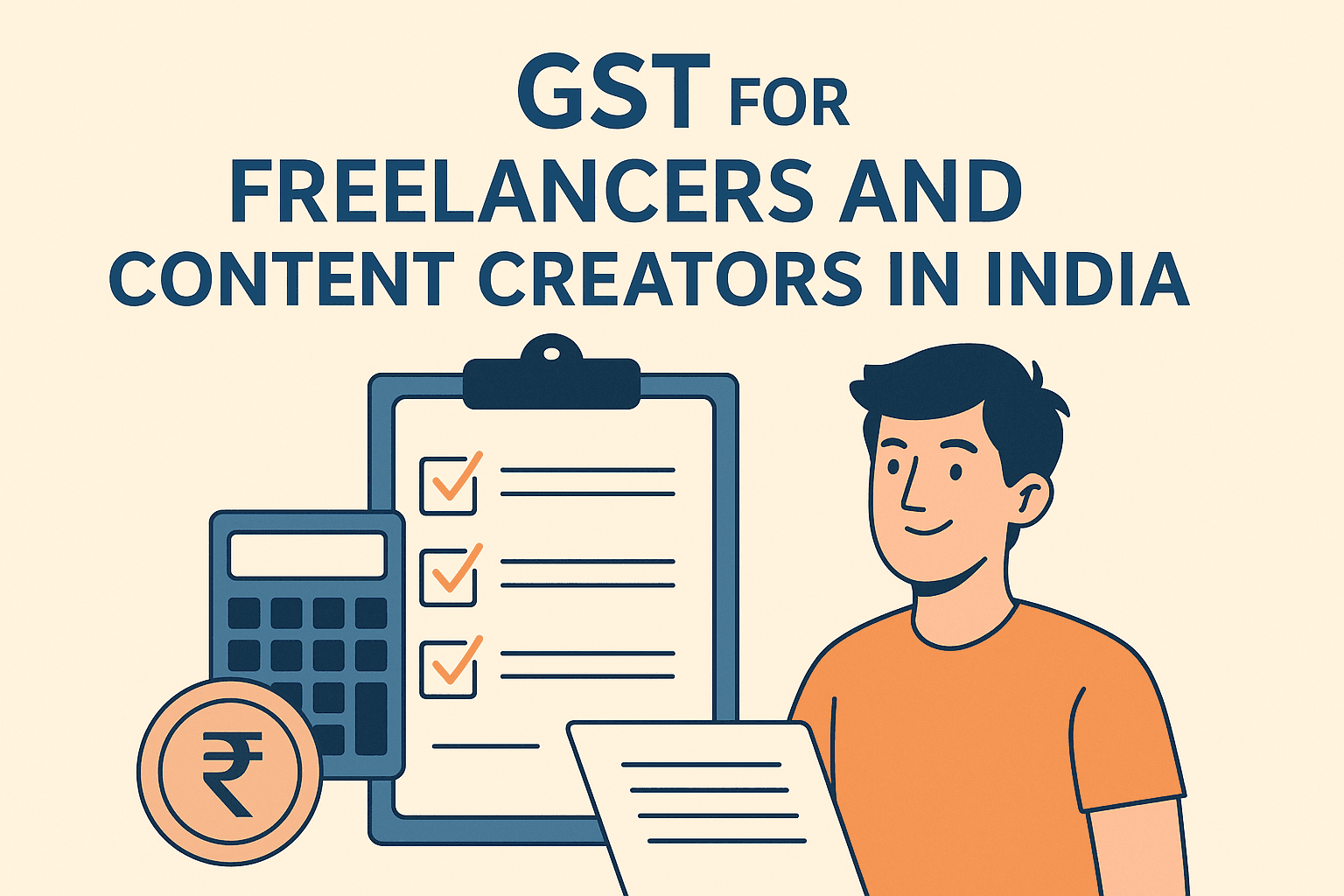Introduction
Freelancing and content creation are booming in India. Whether you’re working with international clients through platforms like Upwork and Fiverr or earning from YouTube and selling online courses, it’s important to know how GST applies to you.
As a Chartered Accountant, I’ve seen many freelancers either follow unnecessary formalities or ignore the law out of confusion. This blog will clear the basics for you in simple language.
What Is GST and Why Should You Care?
Goods and Services Tax (GST) is a tax on the supply of goods and services in India. If you are earning money through freelancing or digital content, then under GST, you are considered a supplier of service. That means you may be required to register and file returns depending on how much you earn and where your clients are located.
When Is GST Registration Mandatory?
You must register for GST if:
- Your total income from freelancing, content creation, or digital sales exceeds ₹20 lakhs in a financial year.
- If you are located in a special category state (i.e. Mizoram, Manipur, Nagaland, Tripura), the limit is ₹10 lakhs.
- You want to claim GST refunds on input tax credits for business expenses.
- You choose to register voluntarily for better credibility or business requirements.
If you do not cross these thresholds, GST registration is not required.
Exporting Services to Foreign Clients
If you provide services to clients outside India, it qualifies as an export of service, which is a zero-rated supply under GST. This includes:
- Working on platforms like Upwork, Fiverr, or Freelancer
- Direct freelance contracts with foreign businesses
- Providing services and receiving payments in foreign currency
Even though it is considered an interstate supply, you are not required to register under GST unless your total turnover exceeds ₹20 lakhs in a financial year. However, if you want to claim a GST refund on any purchases or expenses, then registration becomes necessary.
So, registration is optional for export of services below ₹20 lakhs, not mandatory.
Earning from Google AdSense, YouTube, and Affiliate Marketing
Many content creators earn income through:
- YouTube monetization
- Blogs with Google AdSense
- Affiliate marketing from Amazon or other companies
These earnings are also considered supply of service under GST.
- If your total income (including affiliate income and ad revenue) exceeds ₹20 lakhs, GST registration is mandatory.
- If it’s below ₹20 lakhs, registration is not required.
- If you register, you need to issue GST invoices and file returns.
Selling eBooks, Courses, and Digital Products
Digital products like eBooks, PDFs, online courses, and templates are treated as online services. These are not automatically taxable unless your total income crosses ₹20 lakhs.
Even if you sell to international customers, it’s considered export of service if:
- The buyer is located outside India
- You receive payment in convertible foreign exchange
- You and the buyer are not merely establishments of the same entity
In such a case, GST is zero-rated and registration is optional unless the income limit is crossed.
Common Misunderstandings Among Creators
- Selling online courses means automatic GST registration – Not true. Registration is needed only if your total income exceeds ₹20 lakhs.
- Exporters must always register under GST – False. If you export services and your income is below ₹20 lakhs, GST registration is not mandatory unless you want to claim refunds.
- YouTube or AdSense income always requires GST – Only required if your total income from all sources exceeds ₹20 lakhs.
- Digital services are always taxable – Not always. They become taxable only once your income crosses the exemption limit or if you register voluntarily.
What Happens After GST Registration?
Once you register:
- You must issue GST compliant invoices
- File monthly or quarterly returns depending on your scheme
- Pay GST on your taxable supplies (though exports are usually zero-rated)
Conclusion
Freelancers and digital creators in India need not fear GST. You are only required to register once your total income exceeds ₹20 lakhs in a financial year, or ₹10 lakhs if you live in a special category state.
Exporting services, earning from YouTube or selling digital courses do not automatically trigger GST registration unless you exceed the threshold. But if you wish to appear more professional or claim tax refunds, voluntary registration is available.
Written by CA Aryan Mittal

